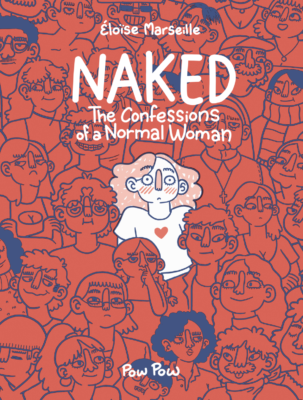Éloïse Marseille is not afraid to take you past thresholds of comfort. She is not afraid to show you genitals, be they healthy or infected, and she is not afraid to portray the reality of a curved belly on a twenty-year-old woman who likes to drink. By page eight, readers are introduced to a naked representation of the author, staring deadpan at the reader, with the full accents of pubic and leg hair.

Naked
Confessions of a Normal Woman
Éloïse Marseille
Pow Pow Press
$24.95
paper
168pp
9782925114239
By page 21, Marseille shares the story of her parents’ marriage, and why, in their separation, she developed a love language tied to the trauma of abandonment. By page 38, she is informed of a life-altering medical condition that changes her perspective of sex. The artist drowns out the noise of her doctors and parents, highlighting the pure shock felt at the time. And despite the lessons learned, Marseille admits her continued discomfort with her body. It’s human, she stresses. Sure, we all need to love ourselves, but if we’re being honest, trauma is lived through, not battled until some conclusive end is reached. Young girls of today’s generation are emboldened far beyond the second wave here. Yes, we’re beautiful no matter what, and yes, too, it can be absolutely terrible to be us.
This is a book for girls afraid they’re wildly abnormal. They’re not supposed to have porn addictions. They’re not supposed to be virgins by a certain age. They’re not supposed to have a sexual drive at all, really. Marseille has written the book to undermine the “supposed to’s” with actualities.
While I could not relate to the book for the most part (an unnecessary part of reading anyway), there were moments that spoke volumes. I, too, was advised to do an ultrasound on my uterus, and to prepare for the event by drinking copious amounts of water. And when the doctor facing my results gasped, I panicked. “Your bladder is so full, you really need to go!” she said, to my great horror and absolute relief.
I have never been puked on during sex, but timely to this review, a lady friend sat on my balcony recounting how she recently had been. I’ve never called a man a cunt, but after reading this book, I wonder if I should have. And I, too, have debated my own sexuality, with the knowledge that these things are a lot more fluid than anyone ever told me initially. In reading, one appreciates how uniquely the comic form can capture the surreal oddity and intensity of an orgasm.
Marseille tells these stories through the endearing Montreal landscape. She speaks of things that, to me, read so true to the spirit of the city. Starting your undergrad, drinking at bars in the Plateau, experiencing your first sexual encounters at erotic themed parties. Montreal, for so many I know, is centered around a period of so much not knowing. “Is this what that thing everyone talks about is supposed to feel like?” is a thought my peers and I have bonded over in our shared winter streets. A thought Marseille is not only unafraid to put into words, but in clear and concise pictures.mRb






0 Comments